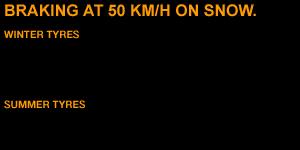As winter draws nearer, with colder mornings and christmas merchandise strewn over shops already. Many of you will be wondering about whether or not to buy winter tyres, like me you're probably thinking will it snow, will we get any ice or will it just be cold.
However as we all know that trying to guess the British weather, is nigh on impossible with even taking what the news says to be a gamble.
 Going back to Winter Tyres, the actual name 'Winter Tyres' is slightly misleading as it implies that they are only to be used in the winter. However with our weather forever changing with low temperatures from September to April it would be more apt to call them 'Cold Weather Tyres' as that's exactly what they are meant for.
Going back to Winter Tyres, the actual name 'Winter Tyres' is slightly misleading as it implies that they are only to be used in the winter. However with our weather forever changing with low temperatures from September to April it would be more apt to call them 'Cold Weather Tyres' as that's exactly what they are meant for.Let me explain a little further, Winter Tyres are designed to be at maximum performance at 7ºC or below. It doesn't matter what the weather, whether it's a sunny dry day or snowing blizzard, winter tyres are designed to perform in low temperatures. That's not to say that in higher temperatures they won't perform, they will but at 90% of their maximum.
The ability of Winter Tyres to perform in cold conditions compared to summer everyday tyres is the down to a specially formulated compound which allows the rubber not to harden once it gets cold, meaning when you're driving the levels of grip aren't compromised.
With this added safety winter tyres braking distance is greatly reduced. On ice travelling at 30 km/h stopping distance is 11m shorter, another 2 car lengths.
On snow the distance is 8m shorter driving at 50 km/h.
If you've decided to buy winter tyres, then like all tyres there is a plethora of options from budget to performance. Like all tyres generally the more you spend the better the tyres, however if you're on a budget any brand of winter tyre is better than a summer tyre in cold conditions. If you're on a budget I would go for Jinyu or Rotalla Winter Tyres, if however you want to go for the best, I would go for either the Continental TS850, Yokohama W Drive or Nokian WR Winter Tyres. Which I would recommend if you have a high powered car or 4x4.
So should you buy winter tyres? The short answer is yes. Most winter tyres will last you 4-8 winters, depending on how many miles you cover. I would change to winter tyres from the end of October and keep them on til April. If however you don't do many miles in the year, you could use your winter tyres all year round. The only down side is slightly less performance, but nothing that is noticeable.
In an ideal world you need to buy your winter tyres as soon as possible due to the limit stocks available. Especially if we have a cold icy winter.







